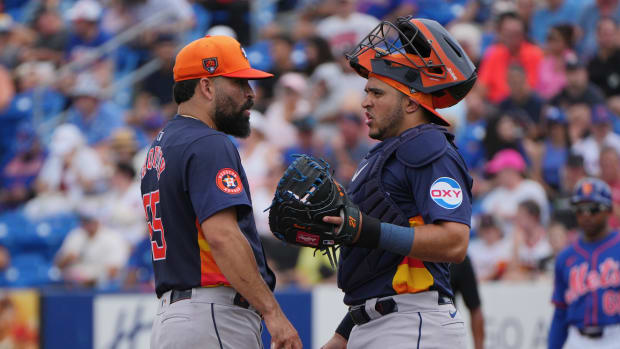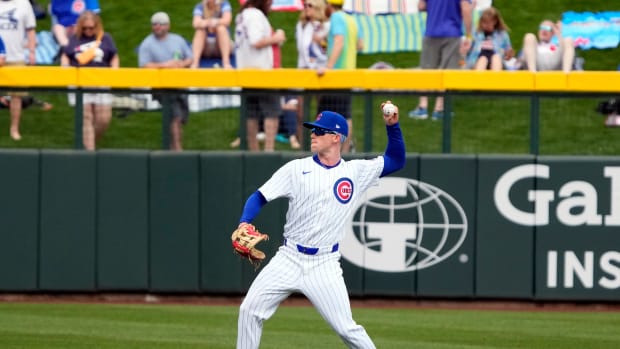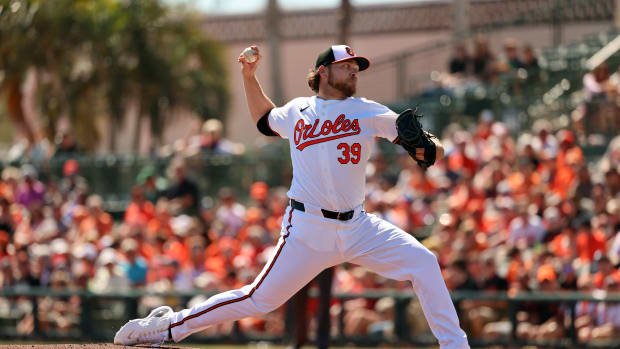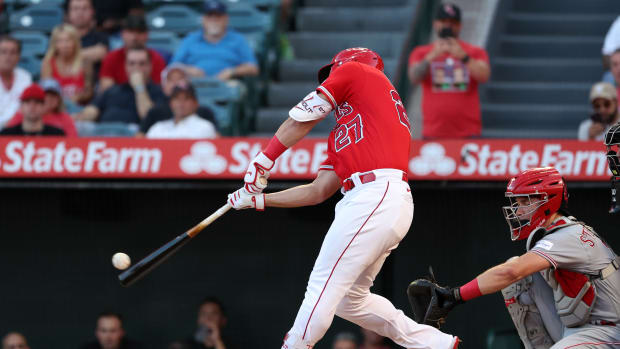After a Career of Being Misunderstood, Byung-Hyun Kim Is at Peace
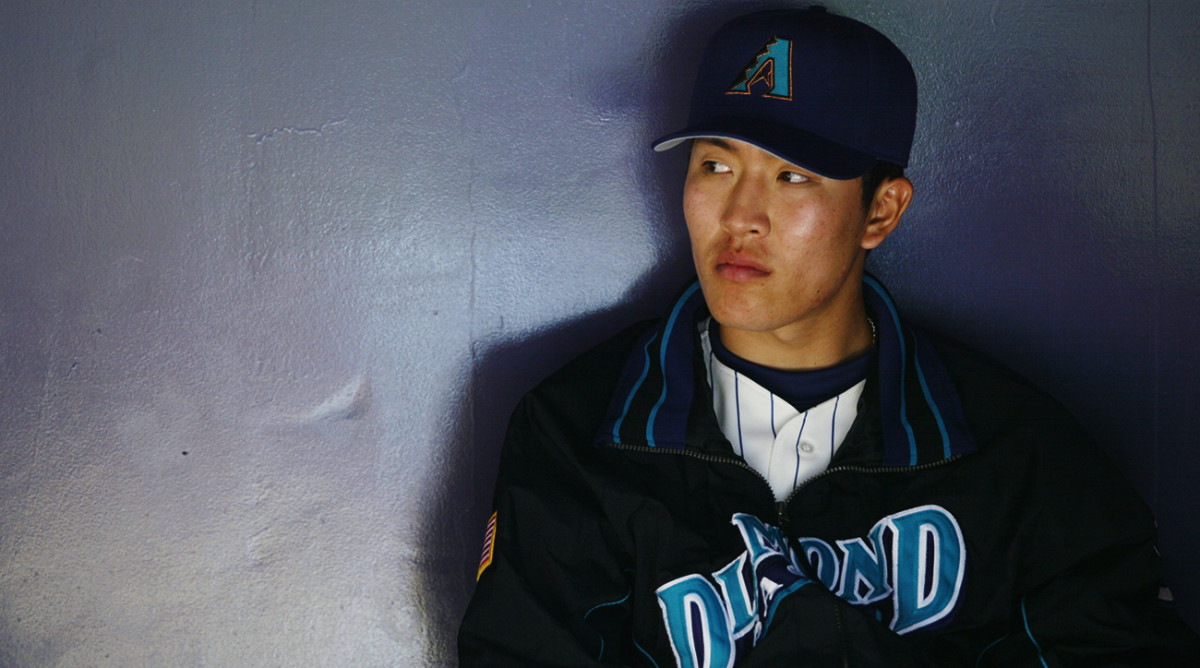
Sports Illustrated’s annual “Where Are They Now?” issue catches up with the stars and prominent figures from yesteryear—past features have included Sammy Sosa, Brett Favre, Dennis Rodman, Tony Hawk and Don King. The 2019 issue features an inside look into the new life of Alex Rodriguez, Yao Ming’s mission for Chinese basketball and more.
Oftentimes, Byung-Hyun Kim found the bullpen to be a lonely place. For eight innings, he would sit and watch the game, mostly without talking. At the time, Major League Baseball did not allow translators in the bullpen, and Kim, who hailed from South Korea, did not speak much English. He tried to fit in with the guys. Sometimes he played their mindless games, like the one where they tried to flick sunflower seeds into a cup. But that only went so far. “There was a lot of downtime,” Kim says. “It was a challenging time for me, personally.”
During all that downtime, sitting in the Arizona Diamondbacks’ bullpen in the early 2000s, Kim struck up a friendship with another reliever named Mike Morgan. Kim was the team’s young, hotshot closer, and Morgan was a journeyman who played for 12 teams over 22 seasons, a former starter who was working mop-up duty in the twilight of his career. If Kim were the quiet one, Morgan was the opposite, always talking, the life of the clubhouse. He took Kim under his wing and helped him bridge the language barrier with the other players. Morgan always empathized with Kim, always took his side. “Mike was always there, chatting me up, joking around, making me feel comfortable,” Kim says. Morgan liked joking about their age difference, how he was pitching in the majors before Kim was even born. Morgan always told Kim if they won the World Series, he could finally retire a happy man.
The Diamondbacks had their chance when they advanced to face the Yankees in the 2001 Fall Classic. It was the first time, perhaps, that the world was introduced to Kim and his side-armed, submarine pitching style. Arizona jumped out to a 2-1 series lead, and then Kim came on to close out both Game 4 and Game 5 at Yankee Stadium. If you’re a baseball fan, you know what happened next. Kim blew the save in both games, which swung the series in the Yankees’ favor, 3-2, and helped spawn Derek Jeter’s “Mr. November” nickname.
After Scott Brosius homered to tie Game 5 in the bottom of the ninth, as the Yankee Stadium crowd went berserk around him, Kim squatted down on the mound and lowered his head. He looked despondent. As Brosius rounded the bases, a few of Kim’s teammates came over to console him. For many, this would become the defining image of Kim’s career.
Earlier this year, Kim retired from professional baseball, after spending the last decade playing in various leagues around the world. He recently agreed to be interviewed over the phone, using a translator, in part it seemed, because he wanted to correct the record on a few things. Due to the language barrier, he often felt misunderstood throughout his career.
Like that scene on the mound, for instance. When Kim squatted down and lowered his head, he says he wasn’t thinking, oh woe is me, as most people probably assumed. He was thinking about his bullpen friend Mike Morgan, and how he had let him down. “It wasn’t me being depressed or down on myself,” Kim says. “It was more feeling sorry for Mike.”
The blown saves didn't cost Arizona the championship, anyway. The Diamondbacks came back and won Game 6 and Game 7. All these years later, the indelible image from that World Series is not Kim crouching down on the mound, but of Luis Gonzalez punching a bloop single into centerfield and driving in the winning run off Mariano Rivera, the greatest closer of all time.
“I missed a bullet,” Kim says, chuckling. “I was very relieved we won.”
After the game, Rivera and Roger Clemens came over and congratulated Kim. He remembers being touched by the gesture. But it was another moment from his career lost in translation. “I don’t know [what they said],” he says. “I didn’t understand their English.”
****
After the World Series collapse, the media would not let it go. Questions followed Kim everywhere he went: Was he OK? How was he coping? How would he ever recover? Everyone who had seen him on that mound assumed he was a broken man. In reality, he had moved on right away. “I was actually pretty mentally strong with it,” Kim says. “I figured, everyone gives up home runs from time to time. It didn’t really bother me that much.”
What really bothered him were the constant questions. In June, Kim returned to Yankee Stadium for the first time since the World Series. He pitched a clean two innings, struck out four batters, and earned the save. After the final out, a teammate handed Kim the game ball, and, smiling from ear to ear, he flung it a few hundred feet into the netting above Monument Park, beyond the outfield wall. “It was an act of defiance,” Kim says. “Just showing the Yankees: Hey, it’s not just you that can hit it over the fence. I can hit it, too.”
In other words, Kim wanted to show everyone he was OK. That feeling drove him all season in 2002, and he ended up having a career year. “I was motivated and mentally ready to prove myself to the world, prove the media wrong about who I was,” Kim says. He posted a 2.04 ERA; compiled 36 saves in 42 chances, setting a franchise record; and made the All-Star team.
Kim didn’t want to be a closer, though. Growing up in South Korea, he had been taught that the best pitchers were always starters. Back home, he had always been a starter. He had only moved to the bullpen because the Diamondbacks’ previous closer had gotten hurt and the coaches had asked him to. In 2003, after his All-Star campaign, Kim moved into the Diamondbacks’ rotation. He recorded a 3.56 ERA in seven starts before Arizona traded him to Boston. The Red Sox promised Kim he’d remain a starter there, too. Then a month later, they asked him to move to the bullpen. “Being a good teammate,” Kim says, “I agreed to.”
Back working as a closer, Kim picked up mostly where he had left off. Over the last three months of the season, he compiled a 2.28 ERA and 16 saves. But he showed occasional signs of cracking, too, blowing three saves. He may have been somewhat affected by an ankle injury he suffered earlier that season. In Game 1 of the ALDS against Oakland, with the Red Sox clinging to a one-run lead, they called upon Kim in the ninth inning. He walked one batter and hit another, but he had recorded two outs, the last one on a swinging strikeout, when Manager Grady Little removed him, apparently to have a lefty, Alan Embree, face the lefty batter. Of course, Embree promptly surrendered a hit and allowed the tying run to score.
Kim was infuriated. Little had done something similar about a week earlier, pulling him from the ninth inning in a game that the Red Sox led, so Embree could face a lefthanded batter. Kim took it as a sign that Little did not fully support him. “They asked me to be the closer, but you’re not having me finish the game?” Kim says. “There was a lot of frustration about that, and then the media started getting on me about how I was selfish and how I was playing for myself, and that wasn’t really the case for me, in my mind.” He had made the sacrifice of moving to the bullpen, and this was how the Red Sox repaid him?
Again, there seemed to be some miscommunication going on. When Kim spoke to the media throughout his career, he would use a translator, but oftentimes it would be someone provided by the team. In Boston, Kim opted to use his trainer in that role. Even so, he found that no matter who was translating, he’d run into issues. The person might not know baseball, or worse. At times, Kim says, “My interpreter’s English wasn’t that great, either.”
After the debacle in Game 1 of the ALDS, the narrative set in, and the fans seemed to turn on him. When the Red Sox returned to Boston for Game 3, the crowd booed Kim during player introductions. He smiled politely, touched his cap, and then raised his middle finger. “In the heat of the moment, I was just being honest to my emotions,” Kim says. “When the fans booed me, I felt really misunderstood, and all of that frustration came out.”
The Red Sox sat Kim the rest of the postseason, saying he had shoulder tightness.
****
As it turned out, Kim would never pitch in the playoffs again. Over the next four seasons, he bounced from the Red Sox, to the Rockies, to the Marlins, back to the Diamondbacks, then back to the Marlins again—all while cycling between the rotation and the bullpen. He also dealt with a number of injuries: to his shoulder, back, hamstring and thumb. No matter where he played, or in what role, he never re-captured the magic he had early in Arizona. In those final years, Kim’s ERA bloated to 5.50, and he lost more games than he won.
By the time he was 29, Kim had been effectively cast out of major league baseball, and so, he set off on his own. He spent time in independent ball and in a Japanese league, before heading back home, to the KBO League of South Korea. He spent four years there and compiled a 6.19 ERA. “As a pitcher, there’s this feeling that we get when everything is right,” Kim says. “Everything moves in slow motion, and you can control your spin rate. I felt like I kind of lost that feel midway through. It was like I was in a maze I was trying to get out of.” At that point, he wasn’t trying to prove the media wrong, but rather, prove something to himself. “I wanted to get that feeling back,” he says, “and I didn’t want to give up until I found it.”
Around this time, Kim met with a doctor, hoping they could diagnose what was going wrong. The doctor concluded that part of the issue was Kim’s diet. When Kim had first come to the U.S., he had taken a liking to American food, junk food in particular. Players had unlimited access to that kind of food at the ballpark, whenever they wanted it, and Kim couldn’t help himself. “They had Coke machines, hot dogs and pizzas in the clubhouse,” he says. “It was really the first time I had the freedom to do what I wanted, in terms of my diet. I didn’t really control myself. I ate too much of the food that was detrimental for me.”
After some reflection, Kim blames this poor diet for the injuries and his premature exit from major league baseball. “Early on in my career, I relied too much on my youth,” he says. “I didn’t take good care of my body at the time, and over the years, that took a toll.”
Kim went vegetarian for a few years and then, this winter, decided to play in the Australian baseball league, at 39-years-old, more than 10 years since he last appeared in the majors. He pitched 9 2/3 innings as a reliever, struck out nine batters, and recorded a 0.93 ERA. “I was happy with myself in that moment,” Kim says, “and that’s when I decided to walk away.”
Now that he’s retired, Kim plans to spend time with his family and tend to the three restaurants that he owns—he has a sushi place in San Diego, and two more eateries in Korea. Occasionally, he’ll also work as a baseball TV analyst in Korea.
Come every October, too, for the rest of his life perhaps, he expects he’ll be asked about the 2001 World Series and his collapse. “I’ve been shown the clip a thousand times through the years,” Kim says. “I understand that obviously it’s a big deal, but I’m kind of over it at this point. It’s not that I have trauma about it, or I’m depressed about it. It’s more, I’ve talked about it a number of times, I’m kind of over it and would rather focus on something else.”
He takes stock of his career, the highs and lows, and says he’s at peace with it. He’s retiring a happy man. “I’m fine with how it happened,” he says. “Now, it’s all a good memory.”



































